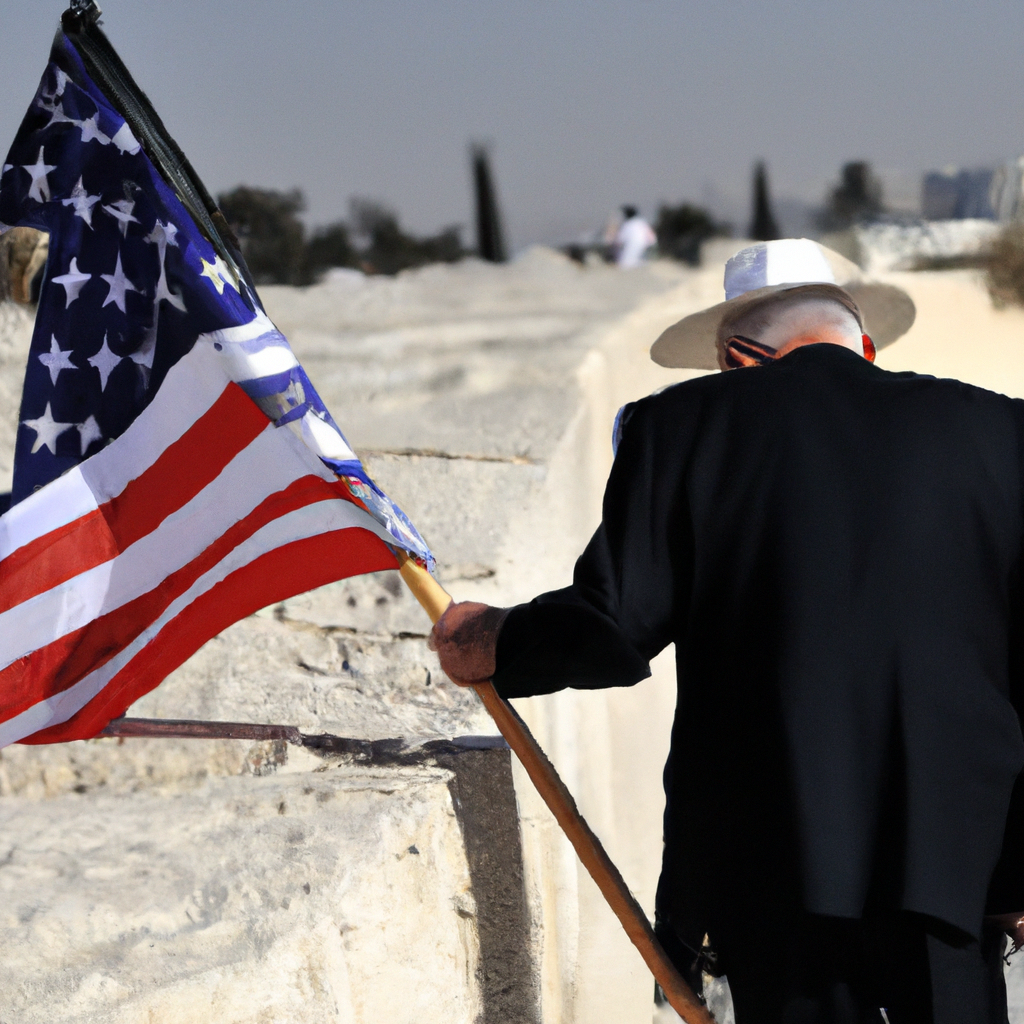In the ever-complex Israeli-Palestinian conflict, it is imperative to understand the role that the United States plays in facilitating or hindering potential resolutions. By examining the historical narratives and the deep-rooted connection that Jewish people have with Israel, it becomes clear that the United States has been a crucial player in maintaining a pro-Israel perspective. Through its support for Israel on various levels, such as political, economic, and military, the United States has been instrumental in shaping the trajectory of this long-standing conflict. However, it is equally important to critically evaluate whether this involvement has had a positive or detrimental impact in the search for a peaceful resolution. So, let’s delve into the multifaceted role of the United States in the Israeli-Palestinian conflict and shed light on its implications.

Historical Roots of the Israeli-Palestinian Conflict
Introduction to the Conflict
The Israeli-Palestinian conflict is a complex and deeply rooted issue with historical origins that date back centuries. It centers around the claims to land and sovereignty by both Israelis and Palestinians in the region of historic Palestine. The conflict has resulted in decades of violence, political unrest, and diplomatic efforts to achieve a peaceful resolution. Understanding the historical context is crucial in order to comprehend the complexities and motivations behind the conflict.
Biblical Significance of Israel
For many Israelis, the land of Israel holds great biblical and religious significance. The Hebrew Bible, also known as the Old Testament, identifies Israel as the promised land for the Jews, who consider themselves the descendants of Abraham, Isaac, and Jacob. The ancient biblical texts depict a strong connection between the Jewish people and the land they believe was given to them by God. This religious and historical connection has played a significant role in shaping the Zionist movement and the establishment of the modern State of Israel.
Jewish Connection to the Land
The Jewish connection to the land of Israel extends beyond religious beliefs to a deep cultural and historical attachment. Throughout history, Jews have maintained a presence in the region, even through dispersal and exile. Jerusalem, in particular, holds immense religious significance as the site of the ancient Jewish temples and Western Wall. For Jews around the world, the desire to reclaim their ancestral homeland and establish a sovereign Jewish state has remained a key aspiration.
Background on the United States’ Involvement
US-Israel Relationship
The United States has had a longstanding relationship with Israel, rooted in political, economic, and cultural ties. The bond between the two nations can be traced back to the years following Israel’s establishment in 1948, when the US recognized the new state. Since then, the US-Israel relationship has become one of strategic importance, with cooperation in various fields such as defense, intelligence, and technology.
Motivations for US Involvement
The United States’ involvement in the Israeli-Palestinian conflict is driven by a combination of factors. Firstly, there is strong public support for Israel among certain segments of the American population, particularly among Jewish Americans and evangelical Christians. Additionally, strategic considerations play a role, with Israel serving as a reliable ally in a volatile region. The US also seeks to maintain stability and influence in the Middle East for its own national security interests.
Historical Actions by the US
Throughout history, the United States has played a significant role in shaping the dynamics of the Israeli-Palestinian conflict. The US has facilitated diplomacy and negotiations between the two parties, often acting as a mediator. It has also provided substantial military aid and political support to Israel, solidifying its position as a key player in the region. However, the US’s approach to the conflict has evolved over time, with different administrations adopting distinct policies and strategies.
US as a Mediator and Diplomatic Influencer
Role as Mediator
The United States has frequently assumed the role of mediator in Israeli-Palestinian peace negotiations. It has facilitated talks and acted as a diplomatic broker between the Israelis and Palestinians, attempting to bridge the gaps and find common ground. From the Oslo Accords of the 1990s to recent initiatives, the US has actively sought to mediate a comprehensive peace agreement and foster dialogue between the two sides.
Peace Process and Negotiations
Over the years, the United States has been involved in various peace processes and negotiations aimed at resolving the Israeli-Palestinian conflict. These efforts have included the Camp David Accords in 1978, the Madrid Conference in 1991, and the Annapolis Conference in 2007, among others. The US, along with international partners, has sought to address the core issues of the conflict, such as borders, settlements, Jerusalem, refugees, and security.
US Policy and Stances
US policy regarding the Israeli-Palestinian conflict has been shaped by numerous factors, including domestic politics, international considerations, and changing regional dynamics. While the US has generally advocated for a two-state solution, its approach and specific positions have varied across different administrations. Some administrations have prioritized diplomatic engagement, while others have taken a more hands-off approach. The US has consistently emphasized the importance of direct negotiations between the parties to achieve a lasting and just resolution.
US Support for Israel
Military Aid and Alliances
The United States has been a major provider of military aid to Israel, both in terms of financial assistance and advanced weaponry. This support has been crucial to Israel’s defense capabilities and its ability to maintain a qualitative edge over its neighbors. The US-Israel relationship extends beyond military aid, with joint military exercises, intelligence sharing, and cooperation in counterterrorism efforts.
Political and Diplomatic Backing
In addition to military support, the United States has consistently provided political and diplomatic backing to Israel on the international stage. This includes defending Israel’s interests at the United Nations and vetoing resolutions critical of Israel. The US has also played a key role in facilitating Israel’s normalization agreements with Arab states, further strengthening its diplomatic standing.
Reasons for Support
The reasons behind US support for Israel are multifaceted. They include shared democratic values, cultural ties, strategic considerations, and historical alliances. The historic persecution of Jews, particularly during the Holocaust, has also influenced public sentiment and the US government’s commitment to Israel’s security. Moreover, lobbying efforts by pro-Israel groups and influential individuals have played a role in shaping US policy and garnering support for Israel.

US Recognition of Jerusalem as Israel’s Capital
Decision by the Trump Administration
In December 2017, the Trump administration made the controversial decision to formally recognize Jerusalem as the capital of Israel. This move broke with decades of international consensus, as previous US administrations had refrained from taking a definitive stance on the city’s status. The decision was met with both praise and condemnation, as it was seen as a significant departure from established diplomatic norms.
International Reactions and Implications
The US recognition of Jerusalem as Israel’s capital generated widespread international reactions. Many countries expressed concern over the potential impact on the Israeli-Palestinian peace process and the status of Jerusalem as an unresolved issue. Critics argued that the move undermined the perception of the US as an unbiased mediator. Additionally, the decision sparked protests and increased tensions in the region, particularly in Palestinian territories.
US Policy Shifts and Impact on the Conflict
Changes Under Different Administrations
US policy towards the Israeli-Palestinian conflict has gone through shifts under different administrations. While there have been overarching goals of pursuing peace and a two-state solution, the specific approaches have varied. Some administrations have focused on direct negotiations, while others have prioritized other regional concerns or taken a more hands-off approach. These policy shifts can have implications for the peace process and the dynamics of the conflict.
Implications for Peace Process
The US policy shifts on the Israeli-Palestinian conflict have had both direct and indirect implications for the prospects of a peace process. Changes in US positions, such as recognition of settlements or Jerusalem as Israel’s capital, can impact the perceived credibility of the US as a mediator and erode trust between the parties. They can also influence the negotiating positions and strategies of both Israelis and Palestinians, potentially hindering progress towards a resolution.
Criticism and Controversies
US policy decisions regarding the Israeli-Palestinian conflict have often drawn criticism and sparked controversies. Different administrations have faced backlash from various quarters, both domestically and internationally. Criticisms range from accusations of bias towards Israel to claims of undermining Palestinian rights and aspirations. The sensitive nature of the conflict and its global ramifications make US policy choices subject to intense scrutiny and debate.
US Efforts for Peace and Two-State Solution
US Initiatives and Plans
The United States has launched several initiatives and formulated plans aimed at advancing the goal of a two-state solution. These have included peace proposals such as the Peace to Prosperity plan presented by the Trump administration and the Road Map for Peace proposed by the George W. Bush administration. These initiatives have sought to address the core issues of the conflict and outline potential pathways towards a resolution.
Obstacles and Challenges
Despite US efforts, numerous obstacles and challenges persist in achieving a viable two-state solution. These include territorial disputes, the status of Jerusalem, security concerns, the right of return for Palestinian refugees, and the ongoing expansion of Israeli settlements. There is also a lack of trust and deep-seated mistrust between the parties, making meaningful negotiations and compromises difficult to achieve.
Prospects for Success
The prospects for successfully resolving the Israeli-Palestinian conflict and establishing a two-state solution remain uncertain. While the United States can play a pivotal role in facilitating negotiations, ultimately, the resolution relies on the willingness of the Israelis and Palestinians to reach a mutually acceptable agreement. The international community, including the US, will continue to advocate for peace, but the path to a lasting resolution remains challenging and complex.
US Influence on Israeli-Palestinian Negotiations
US Role in Shaping Talks
The United States has had a significant influence on Israeli-Palestinian negotiations throughout the years. As a powerful and influential country, the US has the ability to shape the parameters, agenda, and dynamics of the peace process. Its involvement in facilitating and mediating talks often sets the tone and expectations for the negotiations, and its support or pressure can impact the decisions and positions of the parties involved.
Negotiation Strategies and Tactics
The United States has employed various negotiation strategies and tactics in its efforts to bring Israelis and Palestinians to the negotiating table. These include shuttle diplomacy, bridging proposals, confidence-building measures, and economic incentives. The US has also utilized its diplomatic leverage to pressure both parties to make concessions and take steps towards peace. However, the effectiveness of these strategies can vary depending on the specific circumstances and the willingness of the parties to engage in genuine dialogue.
Consideration of US Interests
In its role as a mediator, the United States must balance its interests and objectives with the needs and aspirations of Israelis and Palestinians. The US considers its national security concerns, regional stability, and alliances in the Middle East when formulating its positions and policies. However, striking a delicate balance and ensuring impartiality can be challenging, especially as the US’s relationship with Israel remains strong.
US Public Opinion and Domestic Politics
Impact of Public Sentiment
US public opinion plays a role in shaping the country’s approach to the Israeli-Palestinian conflict. Different segments of the American population have varying levels of support for Israel or sympathy for the Palestinian cause. The attitudes and perspectives of voters can influence political figures and impact US policy decisions related to the conflict. Public sentiment regarding Israel, Palestine, and the peace process can often be influenced by media coverage, personal experiences, and cultural and religious factors.
Influence of Pro-Israel Lobby
Pro-Israel lobbying groups have a significant influence on US policy towards Israel. These organizations, representing various Jewish and pro-Israel interests, work to shape public opinion, contribute to election campaigns, and advocate for policies in line with their objectives. The pro-Israel lobby’s influence is evident in the consistent congressional support for Israel and the allocation of military aid. However, it is important to note that diverse views on the conflict exist among Jewish Americans and within the broader American population.
Political Dimensions of Support
US support for Israel is often subject to political dimensions, including partisan politics and electoral considerations. Political figures and parties may align their positions on the Israeli-Palestinian conflict to appeal to certain voter bases or to align with their party’s platform. This can lead to policy differences across administrations and potentially impact the nature and extent of US engagement in the peace process.
International Perception of US Involvement
Global Views on US Role
The United States’ role in the Israeli-Palestinian conflict is viewed differently across the international community. Some countries perceive the US as a crucial mediator and indispensable player in the peace process, while others criticize its stance as biased towards Israel. The perception of the US’s ability to broker a fair and lasting resolution is influenced by its past actions, policy decisions, and perceived adherence to international law.
Critiques and Controversies
US involvement in the Israeli-Palestinian conflict has faced criticism on various fronts. Some argue that the US’s close relationship with Israel undermines its ability to act as an impartial mediator. Others criticize the US for its use of veto power at the UN Security Council to protect Israel from criticism. Additionally, US policy shifts and decisions related to settlements, Jerusalem, and refugees have been met with international opposition and condemnation.
International Response to US Actions
US actions and policy decisions regarding the Israeli-Palestinian conflict have provoked different responses from the international community. These reactions range from support and alignment with US positions to condemnation and calls for a more balanced approach. Countries, regional organizations, and international bodies often express their views and concerns through statements, resolutions, diplomatic channels, and actions like economic boycotts. The international response serves as an important factor in shaping the broader discourse and dynamics of the conflict.
In conclusion, the United States plays a significant role in the Israeli-Palestinian conflict, both historically and presently. Its involvement as a mediator, provider of military aid, and diplomatic influencer shapes the dynamics, negotiations, and perceptions surrounding the conflict. However, US policy choices, shifts, and controversies have implications for the peace process and international perspectives on the conflict. Achieving a just and lasting resolution to the Israeli-Palestinian conflict remains a complex and challenging task, where the role of the United States will continue to be crucial.




